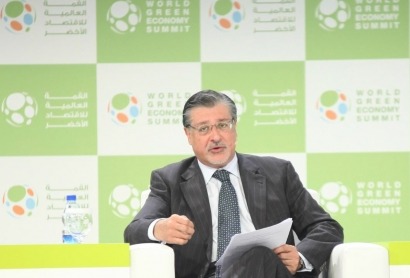
In a statement released this morning, the agency said the transition to a sustainable global energy mix must be accelerated in order to reduce global carbon dioxide (CO2) emissions by 40-70 percent compared with 2010 by 2050.
Renewable energy, IRENA highlights, is the economically viable and technologically proven option to keep CO2 levels below the widely accepted threshhold of 450 parts per million (ppm).
“The latest report by the IPCC reconfirms that averting catastrophic climate change is possible if we act now. But we need to act decisively. Renewable energy, in combination with energy efficiency, provides the most affordable and technologically mature path to bring about the necessary change,” said Adnan Z. Amin, IRENA’s Director-General, at the opening of the World Green Economy Summit in Dubai.
“The accelerated deployment of renewable energy significantly reduces energy-related carbon dioxide emissions at a reasonable cost, and also provides other benefits, including enhanced energy security, more local jobs and value-creation, and a cleaner and healthier environment,” Amin continued.
With an average concentration of CO2 in the atmosphere of 398 ppm at the beginning of 2014, renewable energy provides a path to lower energy-related CO2 emissions and will help prevent a buildup of atmospheric CO2 beyond 450ppm, the wideley accepted threshold to keep global temperature rise to 2 degrees Celsius above pre-industrial levels by 2100.
Based on the world’s current path, annual global energy-related CO2 emissions will rise from 30 gigatonnes (Gt) in 2010 to 41.4 Gt in 2030, according to IRENA estimates.
The IRENA global roadmap for a transition to a sustainable energy future,“REmap 2030”, due to be published in May, shows that renewable energy can reduce emissions by 8.6 Gt to an estimated 32.8 Gt in 2030.
Based on numbers from the International Energy Agency, energy efficiency can yield an additional 7.3 Gt reduction, resulting in global energy-related CO2 emissions of 25.5 Gt by 2030. In addition to improvements in energy efficiency, this path would include a quadrupling of the share of modern renewable energy sources in the global energy mix by 2030.
The renewable energy transition also has positive socio-economic impacts. Investments in renewable energy will create an additional 11 million jobs globally by 2030, and reduce the dependence on imported energy. Accounting already for around half of all new additions to power generation capacity worldwide, renewable technologies are the most economic solution for new capacity in an increasing number of countries and regions. Renewable energy has entered into a virtuous circle of falling costs, increased deployment and accelerated technological progress.
Photo caption: IRENA's Director-General, Adnan Z. Amin, urged the international community to fast-track renewable energy in the fight against climate change at the World Green Economy Summit in Dubai today
For additional information:

